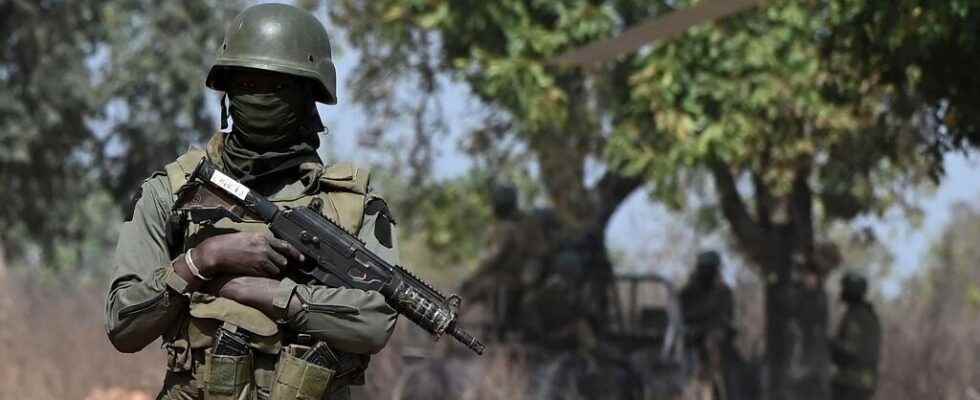The Malian transitional authorities are demanding that Côte d’Ivoire extradite Malian political figures who have found refuge in Abidjan. This is a condition for the release of the Ivorian soldiers arrested on July 10 and still detained. It has been several weeks since RFI revealed this requirement from Bamako, but it had never been publicly assumed.
Friday evening, in a press release from the Malian presidency, Colonel Assimi Goïta clearly links the two files: no release of Ivorian soldiers without the extradition of Malian politicians in “compensation”. Abidjan is angry.
” We now consider it to be hostage-taking and a means of blackmail. This source close to the Ivorian presidency, who for the moment prefers to speak off the microphone, is outraged. ” They want to make President Ouattara pay for the embargo decided by ECOWAS and UEMOA “, Estimates this source, in reference to the sanctions decided by the West African organizations and which had hit Mali for six months, between January and July last, to obtain commitments on the holding of future elections.
” These two questions can’t be linked, it’s a settling of accounts “, Still judges this source, which ensures that the release of the three soldiersjust a week ago, was supposed to be “ the start of a process “And that the remarks made Friday by the Malian President, Colonel Assimi Goïta, are “ change of speech “.
This senior Ivorian official also affirms that this is not the first time: ” They had promised at the end of July not to take legal action ” the case. But in mid-August, the detained Ivorian soldiers were officially charged with, among other things, “undermining state security”. They have since been awaiting trial.
Extradition excluded
At this stage, in any case, delivering the Malian political figures who have found refuge in Côte d’Ivoire is categorically excluded by Abidjan. We are talking about the son of former President IBK, Karim Keïta, former Prime Minister Boubou Cissé and former Minister Tiéman Hubert Coulibaly, against whom the Malian justice has issued international arrest warrants in various cases.
All these personalities do not reside permanently in Abidjan and are not necessarily present there, even if they stay there regularly. In any case, Abidjan clearly refuses to submit to what is considered ” blackmail “.
In his official statementthe Malian transitional president, Colonel Assimi Goïta explains that it is a simple ” consideration “, without which the release of the Ivorian soldiers would not be a” lasting solution ” but in the contrary, ” a one-way solution “.
It is still too early to say whether Abidjan could take a tougher stance, but a National Security Council should be convened early next week on this subject. We know that means of pressure, even reprisals, exist: there are three million Malians in Côte d’Ivoire and many economic interests, since thousands of Malian trucks load goods every week in Abidjan or San Pedro . Côte d’Ivoire also supplies electricity to Mali.
” We differentiate between the ruling junta and the Malians, reassures this Ivorian source, for the moment, we favor appeasement. But obviously, the question is how long.
Other tracks
Other avenues of negotiation are on the table. On the economic level, precisely, Mali wants the Ivorian President Alassane Ouattara to use his influence to obtain funding from ECOWAS. On this point, ” President Ouattara has made no commitments, but he could plead for Mali “, assures our source close to the Ivorian presidency, who adds: “ But only if relations between the two countries go in the direction of normalization, and in no case in return for the release of soldiers who have done nothing. »
As a reminder, the Ivorian soldiers were arrested on July 10 when they got off the plane at Bamako airport, when they came to Mali as part of support for the United Nations mission in the country, Minusma. But administrative malfunctions led to their arrest. Dysfunctions officially recognized by Abidjan, during the release of the three soldiers last week; terms “ shortcomings ” and “ misunderstandings were officially pronounced.
The Minusma meanwhile agreed to overhaul its procedures for air rotations and to meet Malian requirements in order to avoid new situations of this type. However, Bamako continues to officially consider the arrested Ivorian soldiers as ” mercenaries came to destabilize the country. This did not prevent the arrival, two weeks ago, of a new contingent of 425 Ivorian soldiers, currently stationed in Timbuktu.
►Read also: Mali-Côte d’Ivoire: what blocks for the 46 soldiers still detained
